
In our latest Expert Q&A we talk to Series Producer, Donald Clarke, about his career in TV.
How did you get started in the industry?
My very first gig was on an adaption of Channel 4’s Wise Up for the SABC in South Africa. From there I continued to work on international formats as they were adapted for South African audiences. I then got an opportunity to Series Produce on the prime-time series, Survivor, which is a hugely popular format internationally.
I then founded my own production company which I ran for 10 years before being headhunted to join the production arm of BBC Studios in Africa, Rapid Blue, as an Executive Producer and Commercial Director. Since moving to the UK I have enjoyed being back in production roles.










